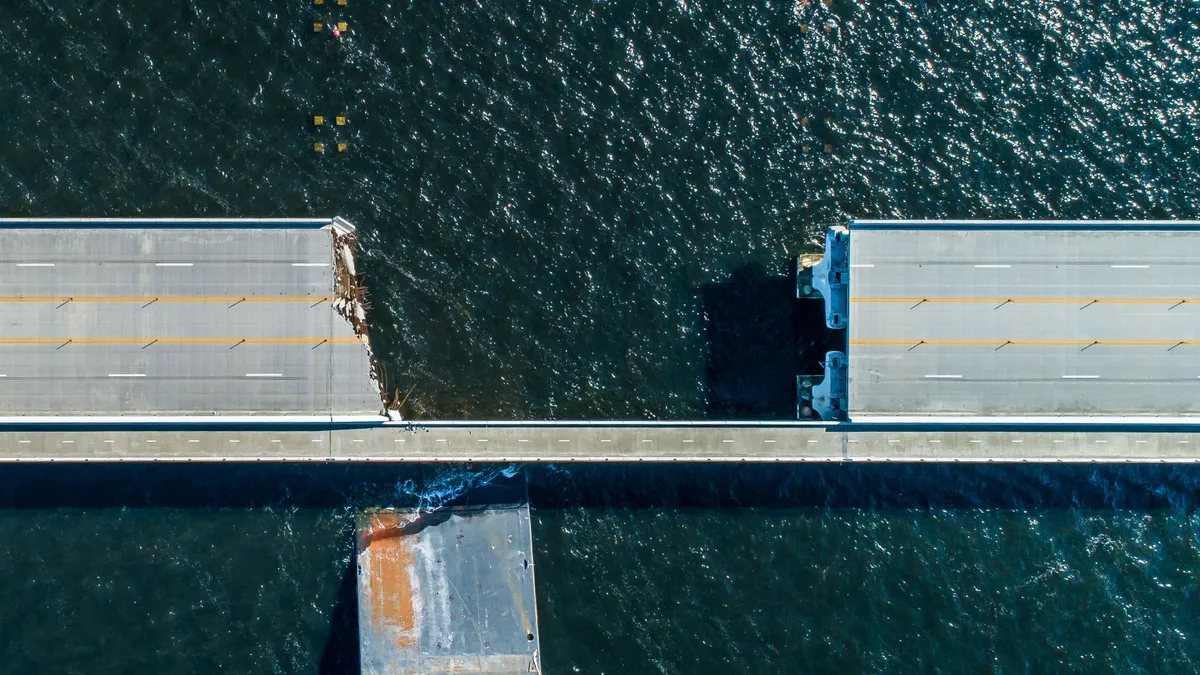UPDATE: Jan. 28, 2022: Skanska USA has filed an appeal to a federal judge's ruling that found it negligent in the Pensacola, Florida, bridge case where 27 of its barges broke loose during Hurricane Sally in 2020.
The firm asked for a new trial and additional findings of fact in the case, according to documents filed in federal court in Pensacola Jan. 18.
In the documents, Skanska disputes an earlier ruling that denied its discovery attempts to find out what actions the U.S. Navy took at nearby Naval Air Station Pensacola to prepare for the storm. It attached two local newspaper articles to its request for a new trial, one headlined, "Not even NAS Pensacola thought Sally would be so bad. They're picking up the pieces too."
In its filing, the company argued, "Accordingly, Skanska is entitled to a new trial after being allowed to conduct the discovery previously disallowed."
A local attorney told the Pensacola News Journal the appeal puts in question the timing of multiple suits filed against Skanska for related damages in state court, as well as a pending class action suit against the company.
Dive Brief:
- A federal judge ruled that Skanska USA was negligent in taking a "wait and see" approach instead of implementing its contractually obligated hurricane plan at the Pensacola Bay Bridge jobsite ahead of Hurricane Sally in 2020, when 27 of its barges broke loose, damaging the structure and causing a nine-month traffic closure on the span.
- The ruling clears the way for hundreds of lawsuits in Florida state court from local businesses and others that claim the bridge's closing caused economic harm, turning a 10-minute commute into more than an hour. But while the judge ruled Skanska can't limit its financial liability to the $1.2 million value of the barges themselves — as it had sought to do under maritime law — he left the question of whether the firm should be responsible for economic losses in the community to the state court.
- Senior United States District Judge Lacey A. Collier wrote that Skanska's obligation to move the barges to a more protected location was clear, even though the storm's forecast changed shortly before it struck, and that its executives should not have been surprised by the resulting damage. "Its only surprise was that its unreasonable choice to discount — or even ignore — the clear warnings of an approaching tropical storm turned out to have harsh consequences," Collier wrote.
Dive Insight:
In a statement emailed to Construction Dive, Skanska said it intends to pursue all legal options, including appeal.
"We are extremely disappointed by the district court ruling, as we believe it is not supported by the evidence or testimony presented at trial," the company said in its statement. "Skanska remains adamant that it took all appropriate measures with the information available at the time to prepare for the storm. Immediately following the storm, Skanska put forth its full resources to address the damage as quickly and as safely as possible and reconnect the communities impacted."
Skanska argued at trial in October that moving the barges offsite wasn't immediately justified, due to the initial forecast that the storm would make landfall further west. By the time the storm's path was more clear, conditions were already too dangerous to tow them further away, Skanska claimed.
Collier's ruling detailed how the timing of the storm — first identified as a potential threat at 4 p.m. on a Friday afternoon before drawing closer to the area over the weekend, while key personnel were away from the site — as well as the changing forecast contributed to a lack of quick, decisive action among Skanska's executives.
Instead, during an impromptu, virtual meeting on Saturday morning that some executives attended remotely from their homes in other regions after leaving the site the day before, the project's leaders chose only to tell workers to be prepared to move the barges if needed.
"It is somewhat difficult to pinpoint exactly how and when Skanska officials made their decision," Collier wrote. "They ended their meeting on the Saturday morning before the storm without an apparent decision on how Skanska would prepare. Instead, they elected to alert needed personnel but otherwise to 'wait and see' how the storm would proceed."
Class action suit
The firm also didn't follow its own hurricane plan that it developed as a part of its $430 million contract with the Florida DOT, the judge wrote.
That plan called for Skanska to move its barges to nearby — and more protected — Butcherpen Cove or another suitable location when sustained winds of 58 miles per hour or more were expected within 72 hours, a condition that was present as early as that Friday afternoon, according to the ruling.
But instead of implementing the formal, previously developed plan, Collier wrote, Skanska executives decided to put in motion a "verbal plan" to tie off the barges at piling stations near the bridge instead. It was from those stations that the 27 barges eventually broke loose when the full brunt of the storm hit the relatively open waters of the bay near the bridge on Tuesday and Wednesday.
In his ruling, Collier wrote that the responsibility for the subsequent damage caused by those errant vessels lies squarely with Skanska's executives.
"Skanska was indeed found negligent, and that negligence sprung wholly from executive decision-making that resulted in the failure to take reasonable measures to protect its barges from the impending storm," Collier wrote.
Separately, a class action suit on the behalf of commuters who couldn't use the bridge for nine months was filed in the wake of the ruling, according to the Pensacola News Journal.














